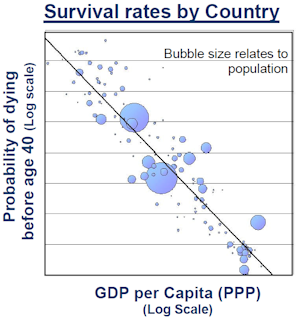Geografia
Pobreza ou carbono?
 Tirar 18,000 pessoas da pobreza ou poupar 220,000 toneladas de CO2?
Tirar 18,000 pessoas da pobreza ou poupar 220,000 toneladas de CO2?
Is saving CO2 emissions more important than reducing poverty?
This is the question the sustainability movement has wrestled with when trying to decide whether air-freighting goods from Africa can be considered a sustainable activity or not. |
Increased trade with Africa improves the livelihoods of some of the world’s poorest people, but how does this weigh against the CO2 incurred in transporting goods from Africa to the UK?
Whilst quantifying the CO2 impact of transporting goods is relatively easy,the social benefits arising from increased trade are much harder to quantify –
How How do we measure the social benefits of trade?
Sequoia believe that the data published within the UN’s human development report provides a high level approach to quantifying the social benefits of trade – against an established set of welfare indicators. |  |
The UN report provides human development statistics for over 190 countries and establishes a clear relationship between economic wealth and improved living standards.This relationship allows the social improvements associated with increased exports to be estimated for any developing country. For example, in 2005, the UK imported £52m of flowers from Kenya. Analysing the data in the UN report reveals that a £52m addition to the Kenyan economy would typically lead to all of the following benefits: |
|
|
- 18,000 people lifted above the income threshold of $2 per day
- 2,600 more children enrolled into secondary education
- 4,200 fewer children underweight for their age
- 39,000 more people having access to improved sanitation
- 57,000 more people with improved nourishment
- 91,000 more people surviving to the age of 40
- 125,000 more people with access to an improved water
|
|
Valentine’s Day and Mothers Day account for roughly 20% of UK flower sales - equivalent to lifting 3,600 Kenyans above the income threshold of $2 per day. |
Even though importing flowers from Kenya incurs less CO2 than closer alternatives, there remains the argument that flowers are an unnecessary luxury that we could do without – and save a total of 220,000 tonnes CO2 in the process. But at the same time we would have to forego the social welfare improvements listed above.
So the key to determining whether air-freighting flowers from Kenya is sustainable or not, is to decide whether you would rather lift 18,000 people out of poverty or save 220,000 tonnes CO2? |
|
-
Corrupção E Desenvolvimento São Incompatíveis
Fonte: The Economist "The use of public office for private gain benefits a powerful few while imposing costs on large swathes of society. Transparency International's annual Corruption Perceptions Index, published on December 1st, measures...
-
Qual O Limite Para O Crescimento Da Cidade?
"The world is in the throes of a sweeping population shift from the countryside to the city. Underpinning this transformation are the economies of scale that make concentrated urban centers more productive. This productivity improvement from urbanization...
-
Elogio Do Ensino Da Geografia
Without geography, the world would be a mystery to usDavid Lambert The Duke of York might have boasted to an audience of businessmen in Kyrgyzstan that the UK has "the best geography teachers in the world" – but Ofsted isn't so sure. Its latest...
-
Mapas E Gráficos Sobre Energia E Clima
Population with Access to an Improved Water Source in 2004 In addition to being important for human health, access to an improved water source is indicative of the state of a country's overall physical infrastructure. Access to improved water...
-
O Ensino Da Geografia Nos Eua
Making the Case for Geography in our Schools Christina Salas 10 December 2008 In the wake of the recent presidential election, an increased level of interest has surfaced in this country over foreign issues. While domestic economic issues arguably dominated...
Geografia
 Tirar 18,000 pessoas da pobreza ou poupar 220,000 toneladas de CO2?
Tirar 18,000 pessoas da pobreza ou poupar 220,000 toneladas de CO2?
